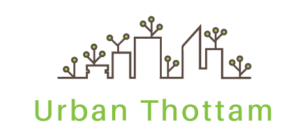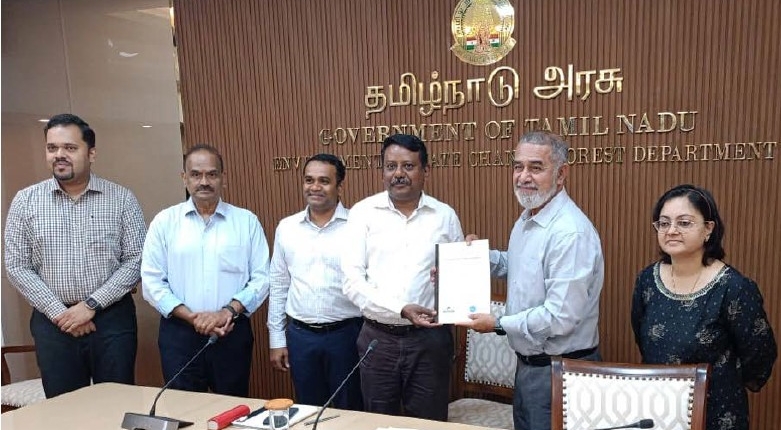The Chennai Resilience Centre (CRC), an organisation supported by Atlantic Council’s Climate Resilience Center and Resilient Cities Network (RCN), is dedicated to building an “Enlightened, Just, and Integrated Chennai” by addressing challenges posed by rapid urbanisation and climate change. Its mandate involves researching, developing, and implementing resilience-building projects for the city, aligning with Chennai’s Resilience Strategy released in June 2019. This strategy outlines five pillars and identifies seven flagship programmes, including the Chennai Urban Farming Initiative (CUFI), Water as Leverage (WaL), and projects related to solid waste management, all of which CRC has been implementing since 2020. CRC recognises the critical need for diverse and multi-disciplinary partners with a shared vision for its programmes’ long-term success.
CRC’s core initiatives and their achievements are:
- Chennai Urban Farming Initiative (CUFI):
- Purpose: CUFI actively transforms urban spaces, communities, and neighbourhoods to enhance resilience against heat, food insecurity, and under/unemployment. Its objectives are to improve food security and diet diversity, provide green livelihood opportunities, and make the city greener and cooler through edible gardens.
- Implementation: The initiative uses modular, portable, and space-efficient Mobile Vegetable Garden Kits (MVGKs). In 2024, CRC continued to support 168 gardens in 144 ICDS centres, 15 homeless shelters, 7 government-aided schools, and 2 resident welfare associations. Since 2020, CUFI has reached 48 homeless shelters, 267 Anganwadis/ICDS centres, 3 RWAs, 10 government-aided schools, 3 resettlement colonies, and 3 informal settlements.
- Training & Capacity Building: CRC provides comprehensive training on organic kitchen gardening, pest management, and composting. Since its inception, 951 teachers, children, women from self-help groups (SHGs), and residents have been trained. A significant aspect is the Madras Mali programme, which has trained 245 women from SHGs to become professional gardeners, empowering them financially and boosting their confidence. In 2024, CRC facilitated work for Madras Malis, with 16 women earning approximately INR 60,000 in total.
- Impact:
- Food and Nutrition: Gardens provide access to fresh, organic greens and vegetables, reducing market purchases for Anganwadis and contributing to mid-day meals. Larger gardens yield 15 kg to 100 kg of produce in six to eight months.
- Urban Cooling: Preliminary findings show rooms directly below rooftop gardens are 2-3°C cooler on average during sunshine hours, with a maximum difference of up to 7°C compared to exposed terraces.
- Well-being and Sustainable Behaviour: Gardening has improved mental health and emotional well-being for Anganwadi teachers and shelter residents. Gardens serve as communal learning spaces for composting, waste segregation, and herbal plants.
- Education: Gardens are used as educational tools in Anganwadis and schools to teach children about nature, shapes, numbers, and basic science concepts.
- Monitoring & Incentivisation: CRC uses surveys, focus group discussions, WhatsApp groups for daily support, and weekly visits to monitor impact and progress. Incentivisation through “Monthly Garden Champion” and “Composting Champions” competitions, which began in 2022, has motivated participants and promoted peer-to-peer learning.
- Future Plans: CUFI aims to influence public policy by leveraging scientific evidence on urban farming’s benefits. It plans to launch Madras Mali as a social enterprise, potentially extending to Chengalpattu District and reaching 1,400 public day care centres. CRC also plans to continue supporting existing gardens and introduce new competitions like “Kitchen Garden Recipes”.
- Urban Ocean Programme:
- Purpose: This programme, implemented with Okapi Research and Advisory, helps cities identify gaps in solid waste management systems, particularly plastic leakage into water bodies, and develops holistic solutions. It aligns with UN Sustainable Development Goals and Chennai’s Resilience Strategy Goal 6.
- Phases: The programme involved rigorous research (Phase I) using the Circularity Assessment Protocol (CAP) to assess waste management gaps. Phase II focused on designing practical solutions through stakeholder brainstorming. Phase III involved pilot pre-planning, leading to the “We Segregate” project.
- We Segregate Project (Pilot IV): Launched in June 2023 in Kasturba Nagar, Adyar, in collaboration with ROKA, GCC, Urbaser Sumeet, and Bisleri’s Bottles-for-Change. It aims to improve waste segregation behaviour in 1000 households.
- Components: Lane Composters (three installed since October 2023) divert organic waste, producing 200-300 kg of compost per cycle. Punch-the-Plastic (PtP) hooks (40 installed) collect low-value Multi-Layer Packaging (MLP) and soft plastics for recycling, diverting ~61,000 plastic bags/packets. A Door-to-Door Awareness Campaign (DtD) uses direct and indirect communication, including events and quizzes, to encourage behavioural change.
- Impact: Between October 2023 and March 2024, buildings “not segregating” dropped from 48% to 31%, while those “segregating well” increased from 37% to 54%. The project diverted 5920 kg of organic waste and 364 kg of food packaging plastic, reducing 10998 kg of CO2e emissions.
- Clean Waterscapes for Healthy Cities: This project aims to scale up and strengthen existing trash boom initiatives in the Adyar and Cooum rivers to trap floating waste and develop sustainable processing solutions.
- Future Plans: Urban Ocean plans to add more Lane Composters and PtP hooks, continue awareness campaigns, develop a guide on creating near-zero waste neighbourhoods, and identify partners for the Clean Waterscapes pilot. Chennai hosted the first in-person Urban Ocean Summit in June 2024, bringing together delegates from 12 cities.
- Water As Leverage (WaL) For Resilient Cities:
- Approach: This Netherlands Government programme, initiated in 2017, focuses on building urban climate resilience through water using an innovative, integrated, and multi-disciplinary approach.
- WaL in Chennai: Coordinated by CRC and Care Earth Trust, it encompasses three key projects:
- Water Balance Pilot Project – Nature-Based Solution (NbS) at Little Flower Convent: In operation since August 2023, this project created a closed-loop system to treat 27,000 litres of grey and black water daily, repair drainage, recharge aquifers, and create cooler, greener spaces accessible to visually and hearing-impaired children. It has stopped sewage back-flow and improved water quality well above discharge standards.
- Water Basin Level Project – Neithal Muttukadu: This project, with official support from the Department of Environment, Forests and Climate Change, aims to improve water management for the Muttukadu-Kovalam basin through a hinterland-to-coast approach, reducing flood/drought risk, improving water availability, and enhancing livelihoods.
- Mylapore Heritage Project: This builds on the Little Flower Convent pilot, aiming for a community-based water balance model in Mylapore by restoring temple tanks, introducing constructed wetlands, and creating detention areas using bioswales.
- Collaboration & Dissemination: CRC organized a “Water Matters Meeting” in January 2025 with officials and experts from four countries and two Multi-Lateral Development Banks to foster coordination and share resources on Chennai’s water challenges. A workshop for GCC Storm Water Drain engineers in August 2024 disseminated knowledge on integrating Ecosystem-based Adaptation (EbA) solutions into water projects.
- Future Plans: WaL aims to develop an international standard DPR for the Neithal Muttukadu project and continue capacity-building workshops for government departments on integrating NbS in water and drainage projects.
Key Engagements and Awards: CRC has fostered partnerships with organisations like Resilient Cities Catalyst (RCC) for programmes like the Neighbourhood Small Business Climate Resilience Program. It engages with various government (GCC, CMDA, TNGCC), academic (IIT Madras, University of Copenhagen), and corporate (WIPRO, NIKE) stakeholders for support, knowledge sharing, and collaborations. CRC has submitted several research grant proposals, including one to the Global Disaster Preparedness Centre (GDPC) for assessing urban farming’s heat adaptation potential. CRC’s projects have also gained significant media coverage, including a Deutsche Welle documentary featuring the We Segregate project. The Chief Resilience Officer also received the Vocational Excellence Award – Environment from The Rotary Club of Chennai Towers.


